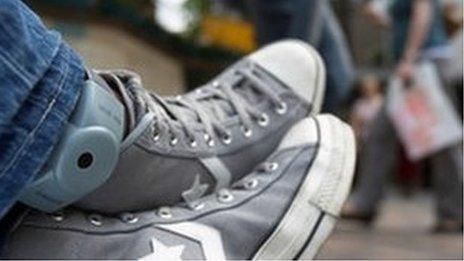Proposals to increase use of electronic tags in Scotland
- Published
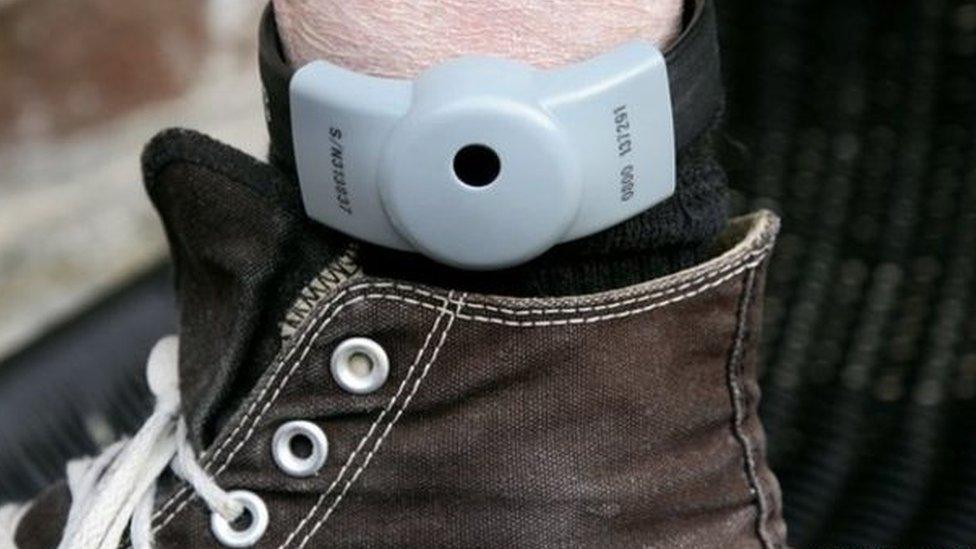
The Scottish government is proposing a radical extension of the ways electronic tags can be used on offenders, BBC Scotland has learned.
Sobriety tags, GPS tracking and tagging as an alternative to remand would be used in Scotland for the first time.
Sobriety tags, which respond to the ethanol levels in a person's sweat, are among the pilots to be announced.
They would be used as an alternative to prison for those who offend under the influence of alcohol.
The changes will require new regulations and legislation.
Under the proposals, other pilots will be announced in the next couple of months.
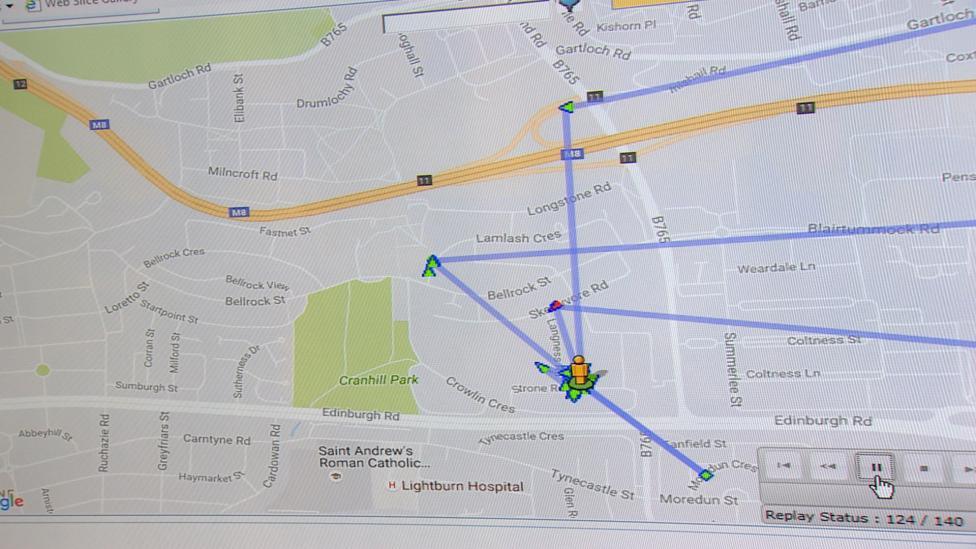
GPS tracking will be used for the first time to monitor certain offenders' movements
All the proposals have been recommended by the expert working group on electronic monitoring, which was created by the Scottish government two years ago.
Tagging has been available in Scotland for almost 15 years and used predominantly to confine offenders to their homes overnight as an alternative to prison or under early release from jail - referred to as Home Detention Curfew.
Voluntary tagging
There are currently more than 1,000 offenders tagged in Scotland.
But under the proposals, in future, tagging will be used as an alternative to remand in prison and as a condition of bail.
And GPS tracking will be used for the first time to monitor certain offenders' movements.
Another option is "voluntary" electronic monitoring for offenders willing to work with agencies to try to stop shoplifting, housebreaking and gang involvement.
The report also calls for monitoring alongside social work support.

'You can be home with your children'
Former inmate Robert says wearing a tag gave him a new lease of life
Robert Johnson has been tagged more than once.
On one occasion he was sent to Barlinnie prison for drugs offences and released early on Home Detention Curfew.
Now 35, he says he has grown up and that he has not offended for more than two years.
He says that being tagged gave him the time and opportunity to re-connect with friends. He has now started up a café with some of them.
"When I was in prison I was ashamed and embarrassed and I didn't want my children to see me there in a place like that.
"Every dad wants to be superman to their children and I didn't want them to see me there, to see me exposed.
"Being at home with a tag and being able to spend time with my family and start looking at education and work, and being with my children, money can't buy something like that."
He added: "In prison you're left in your cell for 23 hours a day locked up with not a lot to do and the chances are if you do do something it's not going to be something worthwhile. On Home Detention Curfew you can be home with your family and your children and start rebuilding your life."

Justice Secretary Michael Matheson said he wanted Scotland to look to the system used in the Netherlands which focuses on outcomes and support.
He hopes the extension of tagging will form part of extensive changes to the whole penal system.
"Rather than just deciding on what kind of electronic monitoring they're going to use, they work out what they're trying to achieve first of all and then look at whether electronic monitoring would help to achieve that aim," he said.
"And it could be different types. It could be GPS or the radio system which we have at the present time. We want to focus on outcomes.
"The report highlights that we could use electronic monitoring in a much more effective way, for example, for individuals remanded into custody."
'Not a soft option'
Angela Smith, service director at G4S Monitoring Technologies & Services in Scotland, said the new system would mean that the numbers of offenders tagged across the country in the future could be "unlimited".
"This is not a soft option. It is a restriction placed not only on offenders but also on their families," she said. "But it does allow them to stay with their families and maintain their jobs and keep relationships together."
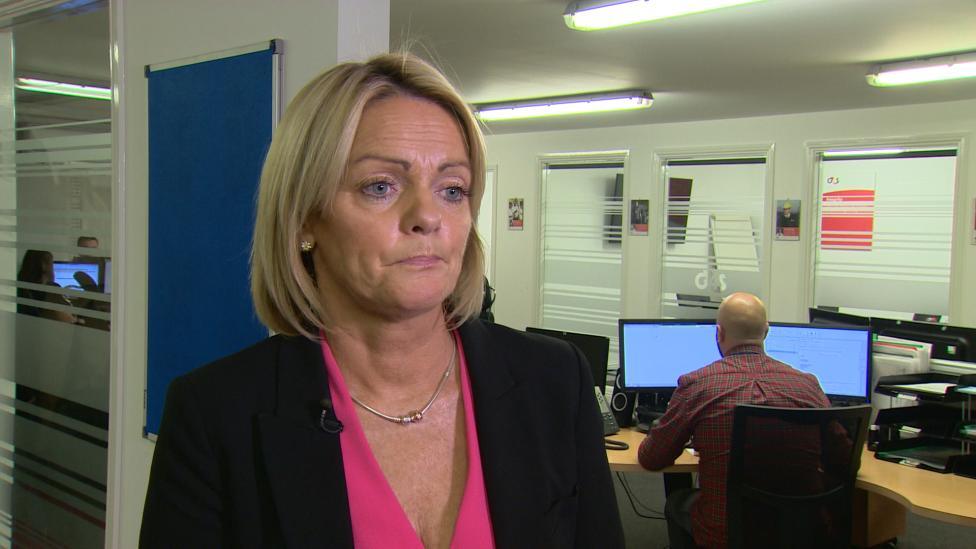
Angela Smith said there could be an unlimited number of tagged offenders
In England and Wales electronic monitoring has faced some controversy with a number of high-profile cases in which tagged offenders have been caught committing further crimes. In 2010 a man wearing an electronic tag in Manchester was left dead in his flat for weeks before his body was found.
Stirling University criminologist Hannah Graham said: "England and Wales have had some issues and scandals with their uses of electronic monitoring, whereas Scotland's approach has stayed fairly simple, stable and small in scale.
"The expert group's recommendations imply Scotland will take a more European approach, learning from the Dutch and Scandinavians as leading examples of how to use electronic monitoring well.
"There's evidence to suggest this is a better and bolder direction for us to pursue.
"But it's difficult to predict how much the use of tagging will increase because this depends on whether these recommended changes are embraced by decision-makers such as sheriffs, some of whom barely use it currently."
She added: "There's an acute need to reduce Scotland's disproportionately high prison population - making better use of electronic monitoring within community sentences offers one way of trying to do this."
Mike Nellis, Emeritus professor of law at Strathclyde University, previously worked as a social worker with young offenders.
He told the BBC's Good Morning Scotland radio programme that tagging should be used in conjunction with other services.
"The technology by itself is very limited if you're trying to change any type of behaviour. Certainly, if we're talking about people with alcohol problems, they have to have the services to help them deal with their alcohol problems."
He added: "Some people are given a sense of self-discipline by having to wear the alcohol monitoring device or indeed any other form of electronic monitoring devices, and I think part of the art of using electronic devices wisely and well is to help people to understand that this is something that they can use to assist them on their journey of desistance."
Scottish Conservative justice secretary spokesman Douglas Ross said there was a place for electronic tagging but he could not accept the "creeping expansion" replacing custodial sentences for serious criminals.
He said: "We saw in recent weeks how some rapists have been escaping jail and instead handed community sentences.
"That's an indication that, when the Scottish government insists on an alternative form of punishment, it inevitably gets used on the wrong people.
"In order to retain public confidence in tagging, this expansion will have to be monitored exceptionally closely."
Scottish Labour's justice spokeswoman Claire Baker said Scotland has one of the highest prison populations in Europe and called for credible and robust alternatives.
"However, for tagging to work both the courts and the general public must have confidence in it as an alternative," she added.
"Without that we will still see people sent to prison on remand or for short sentences.
"Therefore the Scottish Government must ensure that electronic tagging is fully resourced and monitored, yet with cuts to the budgets of the police, our courts, and local authorities, this will be challenging."
- Published24 July 2016

- Published26 August 2015
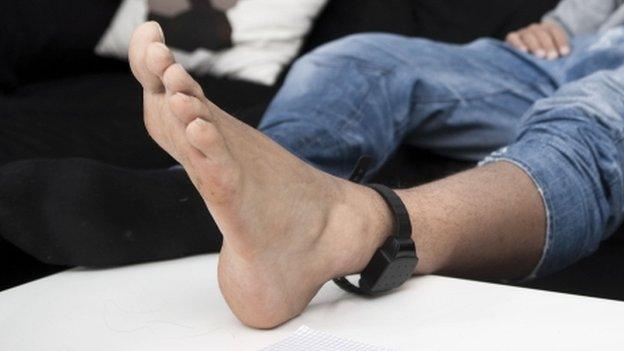
- Published22 September 2013
